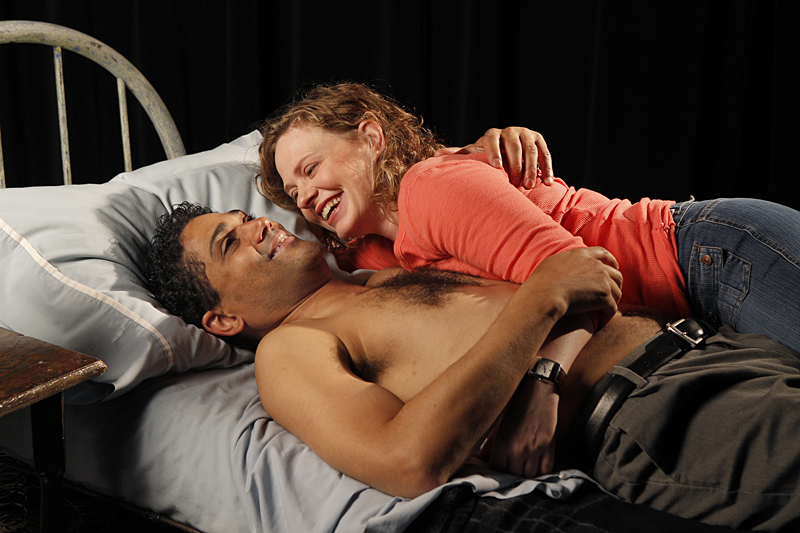The world premiere of Yussef El Guindi’s romantic comedy Pilgrims Musa and Sheri in the New World is cause for celebration, proving ACT’s willingness to take a chance on a local playwright—and see it pay off. Incubated at the prestigious Icicle Creek Theatre Festival, Pilgrims follows hard on the heels of another New York–set comedy, Neil Simon’s The Prisoner of Second Avenue. In Prisoner, the Big Apple is a dysfunctional Darwinian metropolis, where you can count only on family. In Pilgrims‘ immigrant fairy tale, the city is a kinder, more accepting stewpot—which, nonetheless, still has subtle-but-firm rules of engagement between tribes.
On one side of the ethnic/cultural divide is earthy, crass American waitress Sheri (the delightful Carol Roscoe, better known for directing but wonderfully cast here). She’s a sort of blue-collar, insecurity-ridden Ally McBeal with some meat on her bones. After a few taxi rides with mild-mannered Egyptian cabbie Musa (handsome Shanga Parker), she accepts an invitation to his seedy walk-up for a drink. “In about 10 minutes I’m going to be a cinch to bag,” she announces over too much scotch. Sheri promptly flirts, frets, barfs, and pirouettes, letting all her nastier bits hang out. Yet, to her surprise, they aren’t that nasty to Musa, who learned English reading Chandler and Hammett.
But can their lusty attraction compete with his ties to the traditionalist Egyptian community? She’s an infidel, he’s a Muslim—yet one who admits to going to the mosque more to see friends than to pray. 9/11, though never mentioned, still casts a decade-long shadow. (Though Musa is fresh off the boat and lacks a visa, the play makes clear he’s not just looking for a green card through Sheri.)
El Guindi, raised in London and today a U.S. citizen, is best known as a writer of political plays. Staged by Theater Schmeater last year, his Jihad Jones and the Kalashnikov Babes comically deals with Arab-American stereotyping in Hollywood, and his 2008 ACT drama Language Rooms cast two Arab-speaking U.S. interpreters under suspicion in a Gitmo-like interrogation facility. While the generally apolitical Pilgrims is amiably studded with nudity, crudity, and ambiguity, it’s also freighted with spates of didacticism.
Judiciously, under the big-hearted direction of Anita Montgomery, Pilgrims mostly keeps the cultural conflicts local and concrete—thus Musa’s traditional Egyptian fiancee Gamila (the gorgeous and poised Kimberley Sustad), a detail he’d forgotten to mention when he accepted Sheri’s advances. The scene in which she accidentally meets Sheri is a small masterpiece. While Sheri yammers blithely, Gamila, posing as Musa’s sister, absorbs the betrayal with pained grace before turning the tables and delivering an evisceration surgically aimed at Sheri’s vulnerabilities.
Less successful is the white-robed figure of Abdallah (Anthony Leroy Fuller), Musa’s devout roommate who’s gone to Mecca for the hajj (which Sheri likens to “Woodstock on steroids without the music”). First appearing to Sheri in a dream, Abdallah addresses the audience about his wondrously positive experience coming to America: the bounteous food, the friendly women, the plentiful jobs. All these themes are illustrated by Musa and Sheri’s happy romance, making his narration a forced, if poetic, distraction. Musa’s Somali friend Tayyib (Sylvester Foday Kamara) has a similarly ideological, point-making role, warning him to keep to traditional Islamic ways when it comes to marrying.
That El Guindi can salvage Musa’s relationship with both Gamila and Sheri feels like wishful thinking, and Pilgrims‘ light, benevolent spirit is probably best suited to summer. Drama we can leave until fall (when ACT will restage Sam Shepard’s A Lie of the Mind). What’s wrong with feeling good once in a while? Likable leads Roscoe and Parker fully sell the heat and charm of their romance, with plenty of mishaps and raunchy humor along the way.
And as in a fairy tale, Jennifer Zeyl’s appropriately drab sets become magical in the end, thanks to L.B. Morse’s bewitching lighting. The vast constellation of tiny floor lights wordlessly suggests that, in a free-for-all as cosmic as America, heaven is under our feet.








